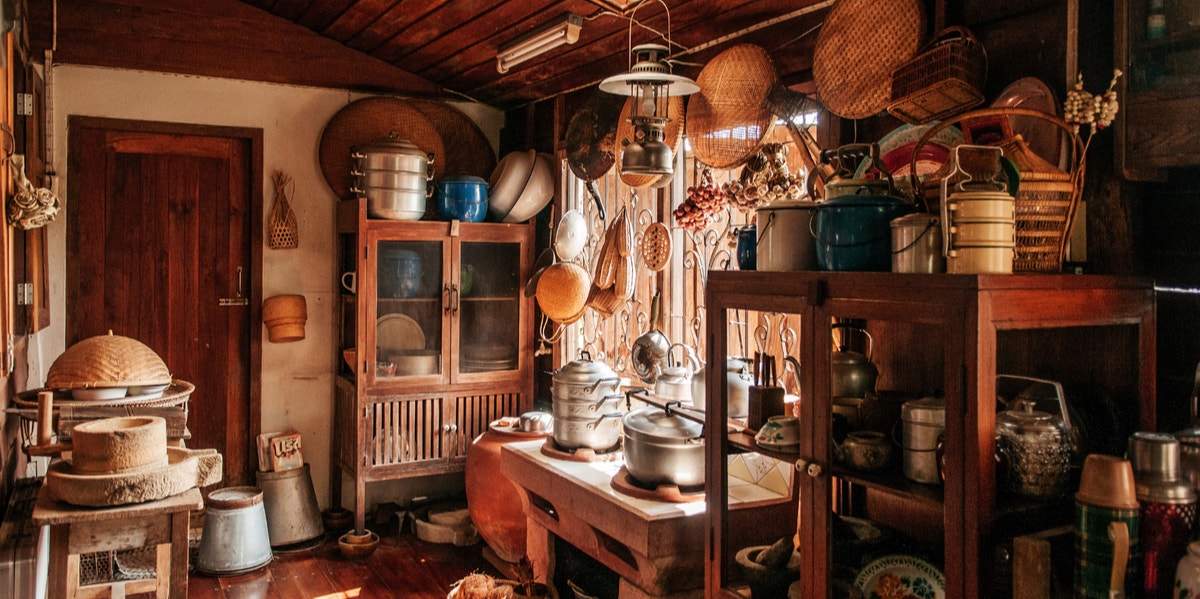The Ghosts Gather In My Kitchen: Living With Grief After 2020
Grief is lonely. Exhausting. I find myself aching to the brim.
 PixHound / Shutterstock
PixHound / Shutterstock They say grief comes in waves, but I resent the comparison. The ocean will drag you under, but there’s a beauty to be found in its wildness. A sense of clarity from falling into the deep. Bent knees, whispered prayers, cracked knuckles, bruised soul.
The ocean connects to the moon, and unlike me, she is not afraid to show it. No poetry to recite, no eulogies given for the millions within her bosom. She could swallow you whole, and you would thank her.
Grief, though, comes in fragments. Similar — but not quite. The clarity comes and goes in the fog. Bits of bone and memory sifted through my fingers. Did he write with his left hand? She used to love this show. I should invite them…oh. Clamped fists, shivering curses, rattling chest, still heart.
I cannot tilt my head to drain the grief from my ears then head home. I am home. There are children to teach and dishes to wash and meals to cook, and hours were putting one foot in front of the other feels like the most selfish thing I have ever done. How dare the world keep spinning? How dare life keep moving? They’re gone, and the Earth not collapsing after them is unfair.
Grief is lonely. Exhausting. I find myself aching to the brim. These spicy noodles are cooked to perfection, and you need to taste them. Those three puppies are adorable, and you need to cuddle them. This bias training for police officers is tense, and you need to crack one of your easy jokes. Filled with a guttural need for them to just be here. For one more minute.
The first thing I notice when I arrive is the whistle of the kettle. Though this group is filled with coffee aficionados, they always have the water ready and a mug waiting for me next to the stove. Swipe a grape from the bowl on the counter, plonk in my infuser, and settle in to discuss.
We cycle through Africana studies, Spike Lee films, queer cinema, capitalism, growing food, buying land, housing policies, black authors, folktales from Ghana, public education, climate change, and a winding road of personal projects.
We cram five of us onto a couch made for two. Who needs personal space after drowning in it for a year? Arms crooked into arms, legs thrown over laps, our hands seek each other as we sit pressed, side-by-side as if our fingertips need constant reminders that we’re here. we’re alive.
I’m so glad you made it. We all need this weekly release, and we will all need more in the months to come.
I’ve lost so much, but I refuse to lose this. My need for community. My hard-fought-for belief is that we can find joy during bone-searing pain. We can eventually choose empathy and dignity for everyone.
When my sibling apologizes for crying about leaving activism work behind because “nothing was changing”, the entire group understands and comforts them. One mentions this is one of the safest places to vent that depressingly universal frustration.
Afterward, they mention that they didn’t know if my friends would be welcoming of their queerness since some Black people still aren’t. “My friend group has become increasingly empaths and/or anarchists.”
I realize a deeper connection as I say it. We all have ghosts in our kitchen, rattling the cupboards in the back of our heads.
In the past few months, I’ve found myself digging in other people’s chests, searching for the community I’ve lost. Visiting gravestones in the morning then curling up on the couch, squished between three friends. Most of us here are young. Young in our bones. Our laughs have not been etched in exquisite detail on their faces.
Our eyes do not curl up and wink around the corners. Our bodies do not show the miles we have yet to walk. The conversations are loud and quick. Points and counterpoints spill from our lips to tangle together on the floor. I love them.
Sharing serious doubts and outright rejections of my faith made me clearly see how many of my community relationships were dependent on both of us being deeply entangled in religion.
Past friends deeply entangled in religion also tended to be nonchalant or outright dismissive of a pandemic that had already swallowed people I love whole. My circle is smaller but feels welcoming. Open arms to lost souls, recovered sanity, and bad puns.
I assumed it would be the opposite after I rejoined the outside world. Wouldn’t I trust less? Open myself up cautiously and slowly? Avoid intertwining my heart with others?
18 months of fear and death is rough on anyone, let alone an empathetic old soul. I’ve lost so much, but I refuse to lose this. My need for community. My hard-fought belief is that we can find joy during bone-searing pain.
We can eventually choose empathy and dignity for everyone. I refuse to close myself off from love.
In Loving Memory of Jane (90), Henry (67), Keaina (36), David (32), Anzu (74), and Sarah (32)
“Kitchen” is the nickname for a black woman’s hair that resides at the nape of our neck. It is often our curliest/kinkiest, untameable, and where fingers, combs, and occasionally people are made to stay.
Miyah Byrd is an educator and storyteller who writes about death, fear, and trauma. Follow her on Medium.

